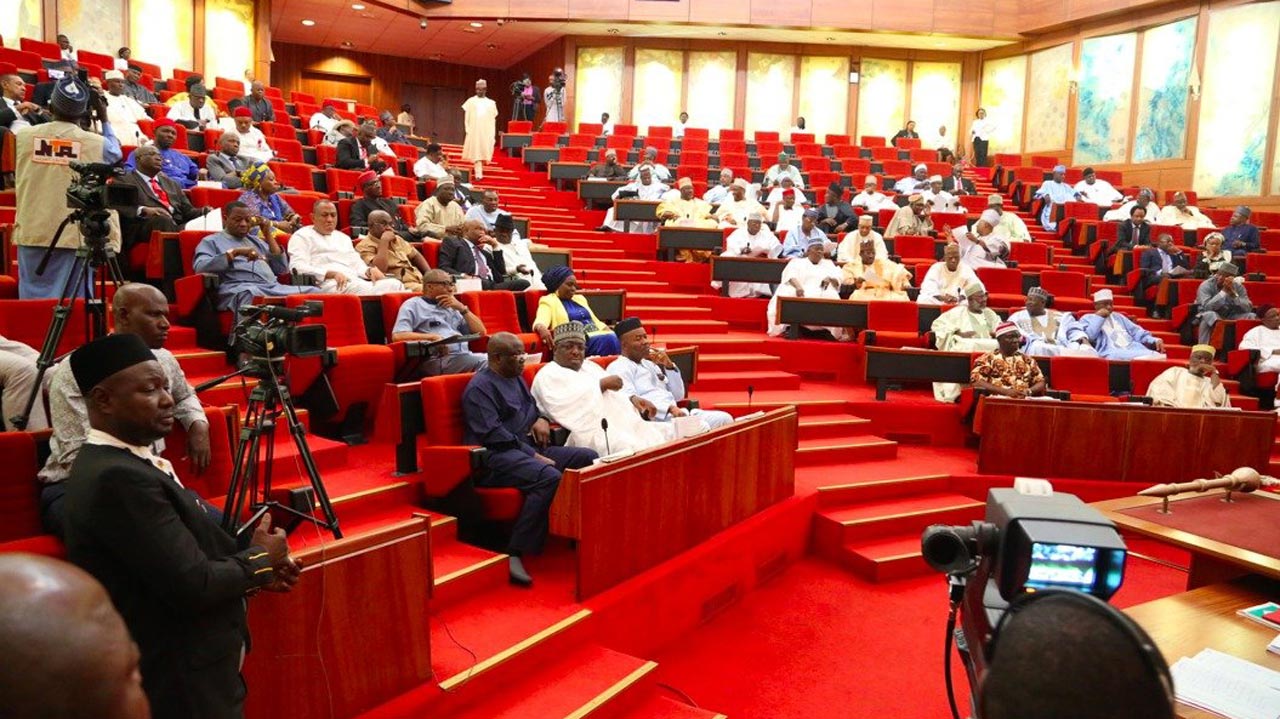Corruption is getting worse in Nigeria, according to the latest corruption perception index (CPI) released by Transparency International (TI) on Wednesday, which shows that Nigeria has dropped 12 places in its Corruption Perception Index.
Whose fault is this, the Executive or the Legislature? Let’s break this down…
There have been several attacks from sponsored sources that allege that the National Assembly is frustrating the efforts of the Executive in fighting corruption.
However, if we look at the facts on the ground, we can see that:
The National Assembly, through the Senate, has been at the forefront of exposing high-levels of corruption in government — yet, the Executive has not done its part to prosecute those that have been exposed.
The Senate exposed the former SGF, Babachir Lawal’s, intimate involvement in a N200million grass-cutting scandal through which funds meant for the Internally Displaced Persons (IDPs) in the North-east were diverted into private pockets. Two Committees, one in the Senate and another one headed by the VP, had indicted the man. Yet, it took President Muhammadu Buhari over 9 months to sack the man. and up till now, he is still has not been prosecuted.
Also, months after the committee headed by Vice President Yemi Osinbajo indicted the former NIA DG over the 43million Dollar Cash in Ikoyi Flat scandal, the man has not been prosecuted. The DG NHIS that was suspended over financial misappropriation bh the supervising Minster was arbitrarily recalled and re-instated without recourse to the report of the on-going investigation by the EFCC.
When a Senator leveled allegations of misappropriation of funds against the Inspector General of Police, instead of he Government to investigate the allegations and allow the IG to seek redress if he feels he has been defamed, the Government sought to intimidate the Senator by filling criminal charge against him.
In the same vein, there are other allegations of corrupt practices leveled against top members of the Executive arm which are simply swept under the carpet.
Now, we know that write-ups like the one being circulated on WhatsApp are now alleging that the National Assembly is frustrating the anti-corruption war will come out as a way of fighting back by the Executive over the AMENDMENT OF THE ELECTORAL LAW in which the Presidency failed to get through its preferred ORDER OF ELECTIONS. This write up is just the Executive arms way of fighting back by stereotyping the Legislative Arm.
NOW BEYOND THE PROPAGANDA, FALLACY AND FALSEHOOD, let’s check the facts.
The Senate has already passed the following bills that are aimed at fighting Corruption in Nigeria:
The Mutual Assistance in Criminal Matters Bill, which is aimed at enhancing the collaboration and mutual assistance between the Nigerian government and its foreign counterparts. This Bill will also help to facilitate the identification, tracing, freezing, restraining, recovery, forfeiture and confiscation of proceeds of crime wherever they are located.
The Whistleblower Protection Bill, which will encourage the disclosure of improper conduct by persons, public officers and corporate bodies, private and public.
The Nigerian Financial Intelligence Unit (NFIU) Bill, which, in line with international best practices, establishes a substantive and autonomous financial intelligence unit in Nigeria, that will promote the exchange of information with all countries in issue that relate to criminal intelligence and financial investigations that deal with money laundering, terrorism financing, proliferation of arms, corruption, financial crimes and economic crimes.
The Witness Protection Bill, which creates a programme in Nigeria that protects witnesses who provide vital information, evidence or render assistance to law enforcement agencies during investigations, enquiries or prosecutions.
Of all these Bills, THE ONLY ONE that was sent to the Senate, from the Executive was the Mutual Assistance in Criminal Matters Bill. All others were initiated, fast-tracked and passed by the Senators.
The article in question also referred to the Special Anti-Corruption Courts Bill which he said the National Assembly has refused to pass. However, it should be noted that the National assembly cannot create a Court through a Bill. Creation of Courts require Constitutional Amendments. That is why the Bill was suspended so that it could be part of the Constitutional Amendment process and the Judiciary could have adequate input.
I am sure it is now clear that the Anti-Corruption war is being frustrated by those claiming to be prosecuting it. The War is being defeated by nepotism, inconsistency, inter-agency rivalry, dishonesty and the lack of adherence to the Rule of Law.

